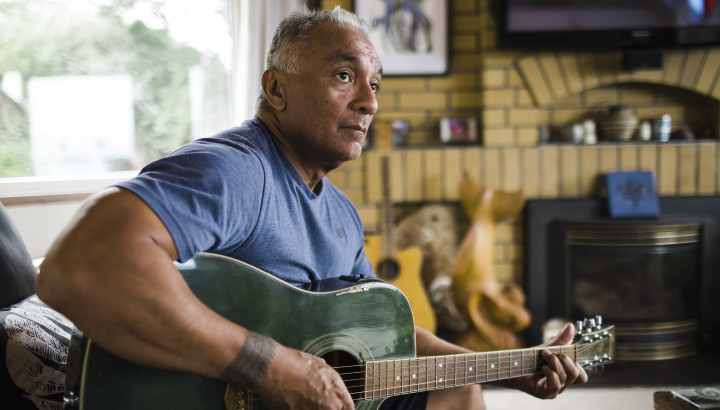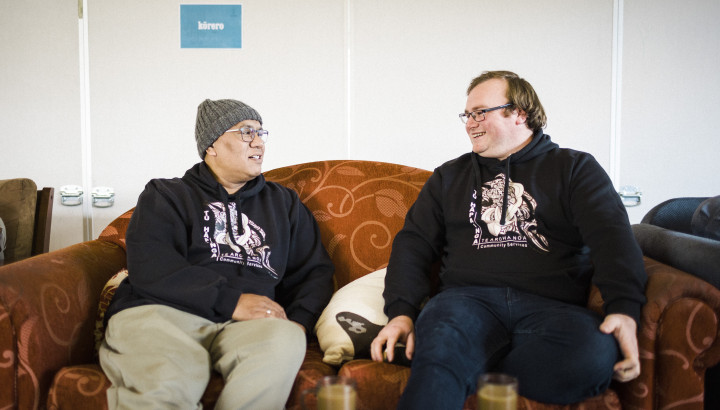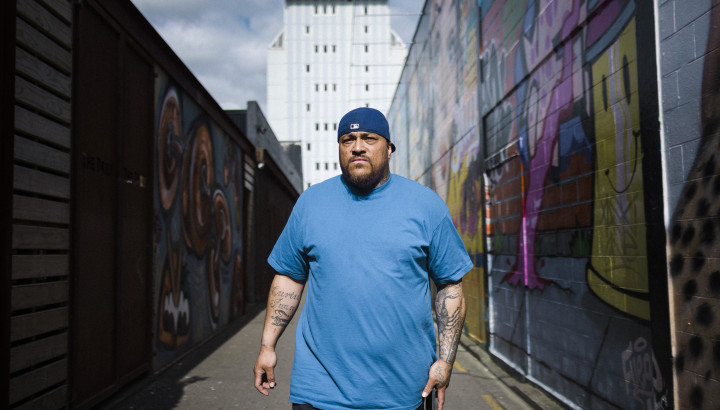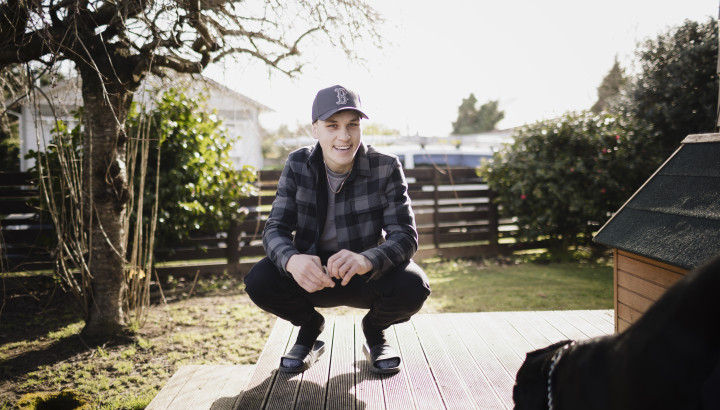Ete shares how counselling and attending a men's group helped him to learn how to manage his anger. He now tells his story now as a way of helping other men experiencing the same struggles he did.
Soft piano music plays in background throughout video.
A black screen with white text says 'Warning. This video contains discussions of violence. Viewer discretion is advised.’
Camera focuses up at a tree canopy. The green foliage of the trees and ferns intertwine and light shines through their leaves.
Ete: “So I think for me the first step in stopping the violence, was just realising that violence was no longer an option.”
Ete and Mele are in their living room with a brick fireplace surrounded by artwork and ornaments. There are windows that look out into their garden. Ete is a strong looking middle aged Samoan man. He is wearing a grey T-shirt. His wife, Mele is a Samoan middle-aged woman wearing a bright shirt with plant patterns on it, her hair is tied into a bun, she has a Samoan tattoo on her right wrist, and she is wearing a Frangipani Flower Sei in her hair.
Ete: “Violence had always been a tool that I'd had in the box.”
Cut to Ete and Mele wearing jackets and shorts walking down wooden steps into the bush. Bold words ‘Thinking About Change’ appear in the centre.
Ete: “It was the last tool that I reached, and it always came out if I was going to win the argument. I decided that tool was no longer an option.”
Cut to Ete in a T-Shirt in the bush surrounded by trees. He is rubbing the goose bumps on his arms. You can see the Samoan arm band tattoo on his left arm and the wrist band tattoo on his right.
Mele: “Because of the whole court system. The first court case. Ah Ete was made to go to anger management classes. So, he started on that road of you know talking about his anger with other men, with professionals. Um to really look at why, ‘why am I angry.’ So that helped.”
Cut back to Mele and Ete in the living room. Ete listens attentively to Mele as she speaks.
Mele: “The counselling I think also helped. One of the things that's, that Ete's really developed is being able to articulate his feelings and not bottle things up because I think the tension would increase, because he would bottle things up.”
Cut to Ete smiling as he is playing the guitar on his own in the living room.
Mele: “He wouldn't tell me what was really going on for him at an early stage and so that that pressure within him would, that anger would build.”
Ete: “How do I regulate my emotions? It's… about practice and it's about getting the results that you want and thinking 'actually this works'.”
Cut to Ete and Mele are in the kitchen, there is a view of the ocean through a window. They are cleaning dishes and stacking the dishwasher together. Ete vacuums the dinning room.
Ete: “You know for me as as a Samoan, speaking about my feelings is really, really difficult. You know as a as a Samoan man. And it's just pushing through that barrier and just getting to the other side getting the result that you want and thinking 'that wasn't that hard actually’.”
Cut to Ete running along Wellington waterfront as the wind ripples through his shirt. Breathless, he reaches the edge of the concrete platform and looks out over the harbour to see the expanse of water, hillsides, and cityscape.
Ete: “So I think practice does make perfect and that sometimes discomfort brings some really, really good results and I should know that because I go to gym regularly, likewise emotionally, and a lot of it also is, is trusting that Mele will awhi (support) me”.
Cut to Ete standing on a balcony at his home. He appears contemplative as he looks out over a view of suburban hills and the ocean. The camera does a close-up on his Samoan wristband tattoo.
Ete: “When I go through that and, and to hear other men and to see other men, from all walks of life. I was sitting around Palagi men, older men, younger men, men that I would walk past in the street and think oh he's a good, you know, law-abiding citizen, he would be a lovely husband. To hear that they had the same problems, they had the same issues ah was, was really, really good.”
Cut to close-up of Ete’s expression of contemplation and grief as he stands outside in the bush.
Ete: “Accepting that there is always going to be that part of you, I think it's really really, really important because just in case you think I'm still, a little bit of me is still defensive and then you think oh god I've, I've failed, I'm no good at this.”
Cut to Ete at home, holding a photo of his wife and child next to some bookshelves. He looks straight at the camera, and we can see a deep sadness and pain in his eyes.
Ete: “It is normal to, to go through the motions and to think okay I'm gonna do what the court wants me to do but I'm still really angry, I'm still blaming the world, it's still everybody else's fault. I think that, that is normal.”
Cut to Ete and Mele in the bush smiling with their eyes closed and their noses pressed against each other in a hongi.
Ete: “As it's not until you've experienced the joy of being in a re relationship where your wife is free or your partner in whatever case that may be is free to be who they are and they can be themselves in front of you, that you can really think 'this is a much better life this is so much easier', you know.
Cut back to Ete and Mele in the living room. Mele is nodding in agreement.
Ete: “And, it and it's the satisfaction you get from that that you then look back and think I want more men to experience this, I, I, want to tell my story because I'll tell you what you go through that fire, and you come out of the other end. Boy, you're a force to be reckoned with when you live that truth. When you live that realisation that … life is just so much better when you're, you're not having to control everybody. And, that the only person you need to worry about is you [laugh]. It was one common factor in all of those relationships breaking up, it was me.”
Cut to Ete laughing with pure joy as he stands in front of a window that looks out over the ocean. He is holding a pair of glasses and a book in his hands.
The screen fades to black, text appears saying: ‘In Your Hands.’ Change starts here. For you and your whanau. ‘One Step at A Time Is All It Takes for Progress.’



